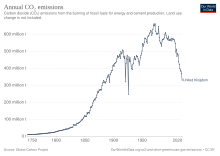Greenhouse gas emissions by the United Kingdom
[1] The UK has over time emitted about 3% of the world total human caused CO2, with a current rate under 1%, although the population is less than 1%.
[3] In 2020 emissions per person were somewhat over 6 tonnes when measured by the international standard production based greenhouse gas inventory,[4] near the global average.
[5] But consumption based emissions include GHG due to imports and aviation so are much larger,[6] about 10 tonnes per person per year.
[9] The UK has been successful in keeping its economic growth alongside taking climate change action.
[14][15] Although carbon dioxide is the main GHG methane (CH4), nitrous oxide (N2O), Hydro-flourocarbons (HFC), Perflurocarbons (PFC), Nitrogen trifluoride (NF3) and Sulphur hexafluoride (SF6) are included.
Transport is the most emitting sector, the Department for Energy Security and Net Zero estimated that it was responsible for about 26% of GHG in 2021.
[1]: 18 There were 50 enterprises in the United Kingdom oil and gas extraction industry with an annual turnover of more than five million pounds as of 2021.
[20] Extracting North Sea oil and gas is estimated to directly emit 3.5% of UK GHG.
[22] As of 2021[update] the net GhG and climate change effects of biomass fuel are still being researched and debated: one large user is Drax Power Station which aims to be carbon negative, but green groups dispute their carbon accounting and say that forests would not regrow quickly enough.
Damaged and degraded peatlands place a substantial financial burden on society because of increased greenhouse gas emissions, poorer water quality and loss of other ecosystem services.
[37] Reductions in methane emissions are largely due to a decline in the country's coal industry and to improved landfilling technologies.
Before 2019 the UK was legally bound by the Climate Change Act to reduce emissions 80% by 2050, but a new law mandating a 100% cut was under discussion in 2019.
[41] It also mandates interim, 5-year budgets, which are:[42] Production targets have been criticised for ignoring the emissions embodied in imports, thereby attributing them to other countries, such as China.
[43] Including these gives a total for consumption based GHG emissions, also called the UK carbon footprint, of about 650 Mt a year.
[48] It has been suggested that value added tax (VAT) on natural gas used for heating should be raised from 5% to the usual 20% and the proceeds used to help poor people.
There are several ways to achieve this goal, such as home insulation, the installation of heat pumps, and the use of renewable energy such as solar panels.



